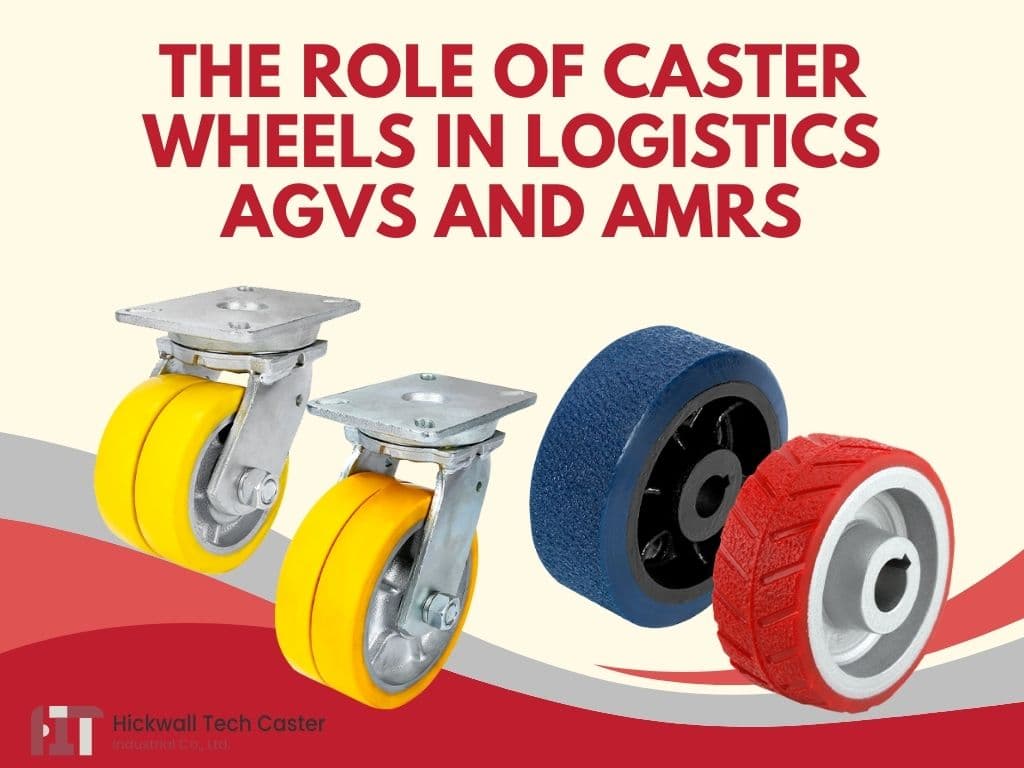The Role of Caster Wheels in Logistics AGVs and AMRs
The Rise of Logistics Unmanned Vehicles (AGVs/AMRs) and the Critical Role of Caster Wheels
When people hear“unmanned vehicles,”many immediately think of self-driving cars on public roads. In this article, however, we are referring to a very different category: logistics unmanned vehicles, also known as Automated Guided Vehicles (AGVs) and Autonomous Mobile Robots (AMRs). These vehicles do not transport passengers; instead, they quietly move goods in factories, warehouses, and hospitals, becoming the backbone of automation and smart logistics.
AGVs and AMRs: Driving Forces in Global Logistics and Manufacturing
With the rise of smart manufacturing, warehouse automation, and digital logistics, logistics unmanned vehicles (AGVs/AMRs) are no longer just assistants but core enablers of industrial upgrades worldwide. Their applications are rapidly expanding across industries:
- E-commerce logistics: sorting, picking, restocking, and delivery.
- Smart factories: lowering labor costs, improving productivity, and reducing risks.
- Healthcare: delivering medicines and supplies in hospitals.
- Retail and services: autonomous delivery and customer support.
According to industry research, the global AGV/AMR market surpassed USD 5 billion in 2023 and is expected to grow at a CAGR of over 15% by 2030. Key drivers include booming e-commerce, Industry 4.0 adoption, medical automation, and advances in AI, 5G, and sensor technology.
Why Caster Wheels Matter for Logistics Unmanned Vehicles
Although small, caster wheels are the first point of contact with the ground, directly affecting performance, efficiency, and safety. Unlike ordinary wheels, caster wheels for AGVs/AMRs must meet specific requirements:
- Wear resistance: withstand continuous high-frequency use without frequent replacement.
- Low noise: essential in hospitals, malls, and public environments.
- Shock absorption: reduces vibration, protects sensitive goods, and stabilizes navigation.
- Maneuverability: swivel and Mecanum wheels allow precise movement in tight spaces.
- Special adaptability: anti-static wheels for electronics, high-temperature wheels for food processing, corrosion-resistant wheels for chemical or outdoor environments.
How Casters Influence AGV/AMR Performance
- Load capacity → Efficiency: heavy-duty casters support smooth, stable heavy-load transport.
- Stability → Cargo safety: shock-absorbing designs prevent tipping, loss, or damage.
- Low rolling resistance → Energy efficiency: reduces motor power use and extends battery life.
- Durability → Lower maintenance: quality casters reduce replacement frequency and downtime.
ESG Perspective: Sustainable Caster Solutions
Casters may seem small, but they contribute directly to ESG (Environmental, Social, Governance) goals:
- Environmental:
recyclable materials, eco-friendly PU, and energy-saving designs reduce carbon impact.
- Social:
noise-reduction improves public comfort; reliable designs enhance workplace safety.
- Governance:
manufacturers adopting international standards and transparency strengthen trust and competitiveness.
FAQ
- Q1: What is the difference between AGVs and AMRs?
AGVs typically follow fixed tracks or magnetic strips, while AMRs use AI and sensors for flexible, autonomous navigation.
- Q2: How are AGV caster wheels different from standard wheels?
AGV/AMR wheels focus on wear resistance, noise reduction, shock absorption, and energy efficiency, while standard wheels mainly meet basic load and mobility needs.
- Q3: Why is low-noise design important?
Quiet casters are essential in hospitals and retail spaces to improve comfort and acceptance.
- Q4: Can caster wheels help reduce carbon emissions?
Yes. Low-resistance casters improve battery efficiency, reducing energy use and carbon emissions.
- Q5: How often should AGV caster wheels be replaced?
Depending on load and frequency, premium caster wheels can last 2–3 times longer than standard wheels, cutting maintenance costs.
Conclusion: Hickwall Tech Caster Role
The logistics unmanned vehicle market is growing rapidly, and caster wheels are more important than ever. They determine how far, how stable, and how sustainably AGVs/AMRs can run.
Since 1994, HICKWALL TECH CASTER has specialized in caster R&D and manufacturing. Our products include heavy-duty casters, shock-absorbing casters, low-noise casters, and customized caster solutions. Widely used in automation, logistics, healthcare, and electronics industries, we proudly serve over 2,000 global clients.
We believe casters are not just industrial parts but the foundation of smart logistics and sustainable growth. Guided by innovation, quality, and ESG principles, Hickwall will continue to deliver caster solutions that help companies worldwide meet the challenges of the automation era.


